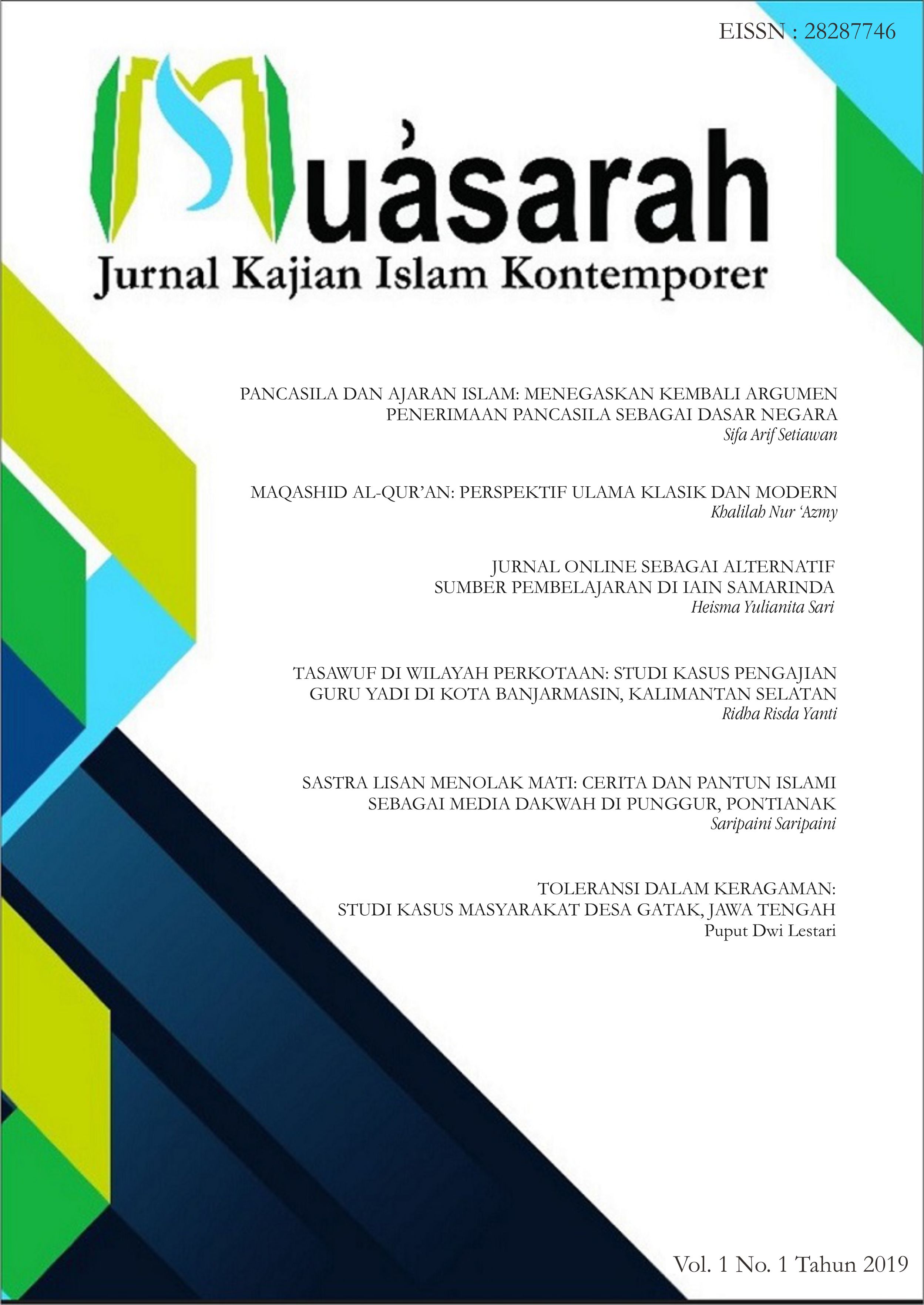TOLERANSI DALAM KERAGAMAN: STUDI KASUS MASYARAKAT DESA GATAK, JAWA TENGAH
DOI:
https://doi.org/10.18592/msr.v1i1.3263Keywords:
diversity, tolerance, theological doctrines, social reality, Keragaman, toleransi, doktrin teologis, realitas sosialAbstract
Abstract: This article takes readers to the Village of Gatak in Central Java to see the tolerance of its multi-faith residents. The author interviewed the village figures, including the village head, religious leaders and the youth to understand the values that support a harmonious social life. She also observed activities that involve villagers regardless of their religions, including, the celebrations of religious holidays. The case of the Village of Gatak shows that tolerance develops with the support of some factors. For example, religious leaders hold and disseminate religious arguments for tolerance. Village leaders lead by examples in cultivating harmony within the community. Members of the community themselves must realize that they need others in life and that they need to respect others if they want peace. The lesson from the Village of Gatak affirms similar findings from other places in Indonesia on tolerance by previous researchers. Abstrak: Artikel ini mengajak pembaca mengunjungi Desa Gatak, di Jawa Tengah untuk melihat toleransi masyarakatnya yang multi-agama. Penulis mewawancarai tokoh-tokoh masyarakat, agama dan pemuda untuk menggali nilai-nilai yang melandasi kehidupan sosial yang rukun. Dia juga mengobservasi kegiatan-kegiatan yang melibatkan semua warga desa tanpa membeda-bedakan agamanya, terutama di perayaan hari besar nasional dan hari besar keagamaan. Berdasarkan penelitian lapangan di Desa Gatak, penulis menyimpulkan bahwa toleransi bisa dibangun jika sejumlah aspek mendukung. Misalnya, argumen keagamaan yang mendukung tolerasi dipegang oleh pemuka-pemuka agama dan disebarkan kepada masyarakat. Keteladanan dari tokoh-tokoh masyarakat yang selalu berupaya menciptakan kerukunan di antara warganya. Masyarakatnya sendiri harus menyadari bahwa mereka perlu orang lain dalam hidup dan perlu menghormati orang lain jika ingin kedamaian. Pelajaran dari Desa Gatak mengafirmasi sejumlah temuan dari wilayah lain oleh peneliti-peneliti lainnya.References
Ali-Fauzi, I. (2015). Produksi Kekerasan di Poso. Retrieved from http://www.paramadina-pusad.or.id/produksi-kekerasan-di-poso/
Bustamam-Ahmad, K. (2015). Toleransi dalam Perspektif Sosial dan Budaya Aceh. Dinas Syariat Aceh.
Fidiyani, R. (2013). Kerukunan Umat Beragama di Indonesia (Belajar Keharmonisan dan Toleransi Umat Beragama di Desa Cikakak, Kec. Wangon, Kab. Banyumas). Jurnal Dinamika Hukum, 13(3), 468-482.
Ghazali, A. M. (2013). Teologi Kerukunan Beragama dalam Islam. Analisis, XIII(2), 281-302.
Juli, M. (17 Oktober 2015). Catatan dari Bentrokan di Singkil. Retrieved from http://www.wahidinstitute.org/wi-id/indeks-berita/321-catatan-dari-bentrokan-di-singkil.html
Kafid, N. (2015). Agama di Tengah Konflik Sosial: Tinjauan Sosiologis atas Potensi Konflik Keberagaman Agama di Masyarakat. Al-A'raf, 12(1). doi:doi.org/10.22515/ajpif.v12i1.1180
Khotimah. (2011). Dialog dan Kerukunan Antar Umat Beragama. Jurnal Ushuluddin, XVII(2).
Nisvilyah, L. (2013). Toleransi Antar Umat Beragama dalam Memperkokoh Persatuan dan Kesatuan Bangsa (Studi Kasus Umat Islam dan Kristen Dusun Segaran Kecamatan Dlanggu Kabupaten Mojokerto). Kajian Moral dan Kewarganegaraan, 2(1).
Panggabean, S. R. (2014). Pemolisian Konflik Keagamaan di Indonesia. Jakarta: PUSAD Paramadina.
Puspito, H. (1983). Sosiologi Agama. Yogyakarta: Kanisius.
Sumbullah, U. (2015). Pluralism and Religious Harmony in Religious Elites Perspectives in Malang City. Analisa: Journal of Social Science and Religion, 22(1), 1-13.
Wekke, I. S. (2017). Harmoni Sosial dalam Keberagaman dan Keberagamaan Masyarakat Minoritas Muslim Papua Barat. Kalam, 10(2).
Zainuddin, M. (2010). Pluralisme Agama: Pergulatan Dialogis Islam-Kristen di Indonesia. Malang: UIN Maliki Press.
Wawancara
Anton Kuswiyanto, 9 April 2017.
Aris, 9 Maret 2017
Christina Sri Setiadi, 3 April 2017.
Juventius Karsono, 2 April 2017.
Marni, 24 Maret 2017.
Muhammad Khotib, 28 Maret 2017.
Rani , 24 Maret 2017.
Seno Guntoro, 9 Maret 2017.
Tiamay, 23 Maret 2017
Walino, 9 Maret 2017
Downloads
Published
How to Cite
Issue
Section
License
Authors who publish with this journal agree to the following terms:
- Authors retain copyright and grant the journal right of first publication with the work simultaneously licensed under a Creative Commons Attribution License that allows others to share the work with an acknowledgement of the work's authorship and initial publication in this journal.
- Authors are able to enter into separate, additional contractual arrangements for the non-exclusive distribution of the journal's published version of the work (e.g., post it to an institutional repository or publish it in a book), with an acknowledgement of its initial publication in this journal.
- Authors are permitted and encouraged to post their work online (e.g., in institutional repositories or on their website) prior to and during the submission process, as it can lead to productive exchanges, as well as earlier and greater citation of published work.






